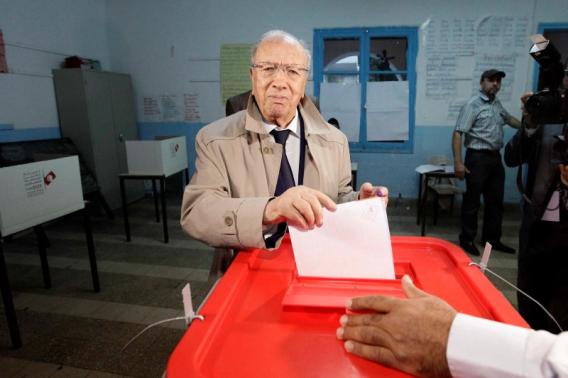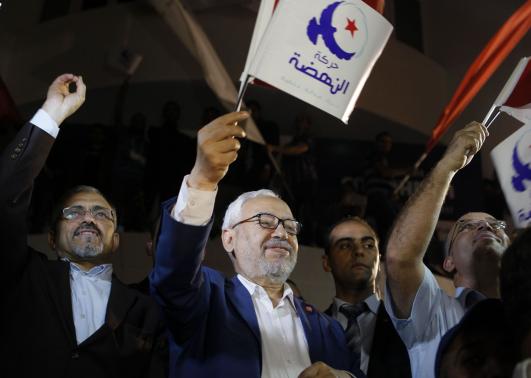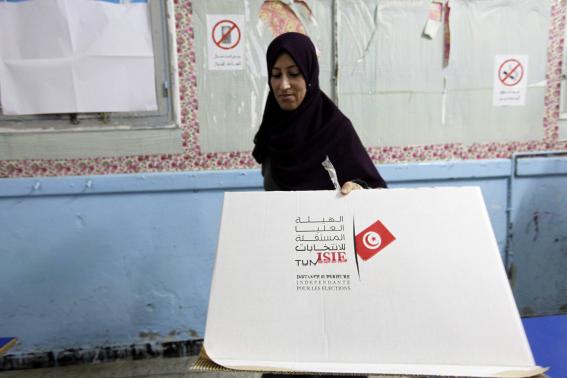www.aljazeerah.info
News, October 2014
Archives
Mission & Name
Conflict Terminology
Editorials
Gaza Holocaust
Gulf War
Isdood
Islam
News
News Photos
Opinion Editorials
US Foreign Policy (Dr. El-Najjar's Articles)
www.aljazeerah.info
|
Editorial Note: The following news reports are summaries from original sources. They may also include corrections of Arabic names and political terminology. Comments are in parentheses. |
Successful Transition from the Revolution to State Stability Through Elections, Secular Nidaa Tunis Bloc Wins More Seats Than Islamist Al-Nahda Movement
October 28, 2014
Editor's Note:
Tunisians have been successful so far in avoiding civil war during the process of transitioning from the revolution to the state stability.
The parliamentary election showed a peaceful and fair comp competition before and during the election process. This way, they have avoided the violent civil wars other Arab states have been experiencing as a result of foreign intervention and refusal of the deep-state operatives to concede.
Tunisians have started the Arab Spring on December 2010 and they have continued to lead the way for the right resolution of the internal Arab conflicts.
They have given hope that the the people may win at the end despite the counter-revolutions, which have been supported by the Zionist "creative destruction" to weaken and destroy the Arab Nation.
 |
 |
 |
 |
Tunisian Islamists concede election defeat to secular party
By Tarek Amara and Patrick Markey
TUNIS Mon Oct 27, 2014 7:25pm EDT
(Reuters) -
Tunisia's Ennahda party, the first Islamist movement to secure power after the 2011 "Arab Spring" revolts, conceded defeat on Monday in elections that are set to make its main secular rival the strongest force in parliament.
Official results from Sunday's elections - the second parliamentary vote since Tunisians set off uprisings across much of the Arab World by overthrowing autocrat Zine El-Abidine Ben Ali - were still to be announced.
But a senior official at Ennahda, which ruled in a coalition until it was forced to make way for a caretaker government during a political crisis at the start of this year, acknowledged defeat by the secular Nidaa Tounes party.
"We have accepted this result, and congratulate the winner Nidaa Tounes," the official, Lotfi Zitoun, told Reuters. However, he repeated the party's call for a new coalition including Ennahda. "We are calling once again for the formation of a unity government in the interest of the country."
Earlier, a party source said preliminary tallies showed the secular party had won 80 seats in the 217-member assembly, ahead of 67 secured by Ennahda.
"According to the preliminary results, we are in the lead and in a comfortable position," one Nidaa Tounes official said, without confirming figures given by the first source.
One of the most secular Arab countries, Tunisia has been hailed as an example of political compromise after overcoming a crisis between the secular and Islamist movements and approving a new constitution this year that allowed the elections.
Electoral authorities were due to give preliminary results later on Monday, but larger parties had observers at polling stations to oversee the initial counts, allowing them to tally results unofficially.
Ennahda, which espouses a pragmatic form of political Islam, won Tunisia's first free election in 2011 after Ben Ali fled protests against corruption and repression, and went into exile in Saudi Arabia.
The party formed a coalition government with two secular partners but had to stand aside in the crisis that erupted over the murder of two opposition leaders by Islamist militants.
During campaigning Ennahda cast itself as a party that learned from its mistakes, but Nidaa Tounes appeared to have capitalized on criticism that it had mismanaged the economy and had been lax in tackling hardline Islamists.
BEN ALI REMNANTS
A Nidaa Tounes victory will open the way for the return of some Ben Ali-era figures who have recast themselves as technocrats untainted by the corruption of his regime, but possessing the administrative skills to run the country.
Since its revolt, the small North African state has fared better than its neighbors which also ousted long-ruling leaders during 2011, avoiding the turmoil suffered by Egypt and the outright civil war of Syria and chaos of Libya.
Many Tunisians are proud of their history of liberal education and women's rights dating back to Habib Bourguiba, the first president after independence from France, and Essebsi portrayed his party as the force of modernity.
But the country also has an undercurrent of hardline, ultra-conservative Islam, and security forces are engaged in a low intensity conflict with militants.
Tunisian militant fighters have long been prominent among jihadis in foreign wars dating back to the 1980s Soviet occupation of Afghanistan, and more than 3,000 are estimated to be fighting for Islamic State now in Syria and Iraq.
Even with an advantage over Ennahda, Nidaa Tounes will need to form a coalition with other parties to reach a majority in the parliament and form a new government.
Ennahda may still be part of any cabinet. Before the elections, the party had called for a unity government to help Tunisia though the last stages of its transition and deal with tough austerity measures to revive economic growth.
Led by Beji Caid Essebsi, a former parliament speaker under Ben Ali, Nidaa Tounes emerged in 2012 as a political force by rallying opposition to the first Ennahda-led government when Islamists won around 40 percent of seats in the first assembly.
Nidaa Tounes drew from Ben Ali officials, smaller parties, and even union leaders to form an anti-Islamist front.
But Essebsi, a veteran politician since after independence, and Ennahda leader Rached Ghannouchi, an Islamist scholar who spent decades in exile in Britain, were also instrumental in the political compromise that pulled Tunisia back from the brink.
While the role of Islam in politics overshadowed the first election in 2011, jobs, economic opportunities and Tunisia's low-intensity conflict with Islamist militants were the main concerns of a country heavily reliant on foreign tourism.
(Reporting by Tarek Amara; Writing by Patrick Markey; Editing by David Stamp)
Ennahda Islamists concede defeat in Tunisia election
France 24, October 28, 2014
Tunisia’s Islamist Ennahda party conceded defeat Monday as its mainly secular rival, Nidaa Tounes, looked on track to become the strongest force in parliament with preliminary results from Sunday's general election starting to roll in.
The Ennahda party, the moderate Islamist movement that was the first to secure power after the 2011 “Arab Spring” revolts that deposed the country's longtime ruler, conceded defeat despite the official results still set to be announced.
“We have accepted this result, and congratulate the winner, Nidaa Tounes,” senior Ennahda official Lotfi Zitoun told Reuters. However, he repeated the party’s call for a new coalition that would include Ennahda. “We are calling once again for the formation of a unity government in the interest of the country.”
Earlier, a party source said preliminary tallies showed the secular party had won 80 seats in the 217-member assembly, ahead of 67 secured by Ennahda.
“According to the preliminary results, we are in the lead and in a comfortable position,” one Nidaa Tounes official said, without confirming figures given by the first source.
It was the country's second parliamentary vote since the 2011 ousting of ruler Zine El-Abidine Ben Ali, which set off copycat movements across much of the Arab world.
One of the most secular Arab countries, Tunisia has been hailed as an example of political compromise after overcoming a crisis between the secular and Islamist movements and approving a new constitution this year that allowed the elections.
Electoral authorities were due to give preliminary results later on Monday, but larger parties had observers at polling stations to oversee the initial counts, allowing them to tally results unofficially.
Ennahda, which espouses a pragmatic form of political Islam, won Tunisia’s first free election in 2011 after Ben Ali fled protests against corruption and repression and went into exile in Saudi Arabia. The party formed a coalition government with two secular partners but had to step aside after a crisis erupted over the murder of two opposition leaders by Islamist militants.
In its campaign ahead of the parliamentary vote Ennahda had cast itself as a party that had learned from its mistakes, but Nidaa Tounes appeared to have capitalised on criticism that it had mismanaged the economy and had been lax in tackling hardline Islamists.
Ben Ali's 'technocrats'
A Nidaa Tounes victory will open the way for the return of some Ben Ali-era figures who have recast themselves as technocrats untainted by the corruption of his regime, but possessing the administrative skills to run the country.
Since its successful revolution the small North African state has fared better than its neighbours, avoiding the political turmoil suffered by Egypt, the outright civil war of Syria and the Islamist insurgency seen in Libya.
Many Tunisians are proud of their history of liberal education and women’s rights dating back to Habib Bourguiba – the country's first president after its 1957 independence from France – and Essebsi portrayed his party as the force of modernity.
But the country also has an undercurrent of hardline, ultra-conservative Islam, and security forces are engaged in a low-intensity but continuing conflict with the militants.
A look at the events leading to Tunisia’s landmark election
Tunisian militant fighters have long been prominent among jihadis in foreign wars dating back to the 1980s Soviet occupation of Afghanistan, and more than 3,000 are estimated to be fighting for the Islamic State group now active in Syria and Iraq.
Even with its advantage over Ennahda, Nidaa Tounes will need to form a coalition with other parties to reach a majority in the parliament and form a new government.
Ennahda may still be part of any cabinet. Before the elections, the party had called for a unity government to help Tunisia through the last stages of its transition and deal with tough austerity measures to revive economic growth.
Led by Beji Caid Essebsi, a former parliament speaker under Ben Ali, Nidaa Tounes emerged in 2012 as a political force by rallying opposition against the first Ennahda-led government when Islamists won around 40 percent of seats in the first assembly.
Nidaa Tounes drew from Ben Ali officials, smaller parties, and even union leaders to form an anti-Islamist front.
But Essebsi, a veteran politician since after independence, and Ennahda leader Rached Ghannouchi, an Islamist scholar who spent decades in exile in Britain, were also instrumental in the political compromise that pulled Tunisia back from the brink.
While the role of Islam in politics overshadowed the first election in 2011, jobs, economic opportunity and Tunisia’s low-intensity conflict with Islamist militants were the main concerns of a country heavily reliant on foreign tourism.
(FRANCE 24 with REUTERS)
***
Share this article with your facebook friendsFair Use Notice
This site contains copyrighted material the
use of which has not always been specifically authorized by the copyright
owner. We are making such material available in our efforts to advance
understanding of environmental, political, human rights, economic,
democracy, scientific, and social justice issues, etc. We believe this
constitutes a 'fair use' of any such copyrighted material as provided for
in section 107 of the US Copyright Law. In accordance with Title 17 U.S.C.
Section 107, the material on this site is
distributed without profit to those
who have expressed a prior interest in receiving the included information
for research and educational purposes. For more information go to: http://www.law.cornell.edu/uscode/17/107.shtml.
If you wish to use copyrighted material from this site for purposes of
your own that go beyond 'fair use', you must obtain permission from the
copyright owner.
|
|
|
|
||
|
||||||


